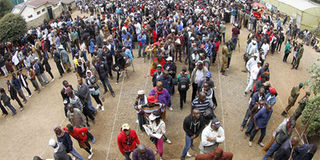System a double jeopardy for democracy

Voters queue at Moi Avenue Primary School, Nairobi during the August 8 election. Our system of winner-takes-it-all is not good for our fledgling democracy. PHOTO | JOAN PERERUAN | NATION MEDIA GROUP
What you need to know:
- First, the simple majority requirement does not incentivise the presidential candidates to espouse inclusive politics or seek broader consensus beyond a loose coalition of tribes.
- Second, when the presidency is won by a simple majority, it invariably disenfranchises almost half of the citizens whose favoured candidate barely fell short of victory.
- As a model, it works well for established democracies, but for a fledgling democracy like ours, we need at least two-thirds majority.
No more ace to play/ The winner takes it all/ The loser’s standing small/ Beside the victory/ That’s her destiny....”
These are lyrics of a song by the iconic Swedish pop music quartet ABBA. But while these introspective words were supposedly occasioned by divorce, they might as well have been written as an elegy for a democracy such as ours that is anchored on the winner-takes-it-all electoral system.
Our Constitution requires that the president be elected by a simple majority — that is, 50 per cent plus one vote — and 25 per cent or more of the vote in at least 24 of the 47 counties.
This, in my opinion, significantly erodes the symbolism of national unity embodied in the institution of the presidency and thus impedes post-election cohesion.
NOT INCENTIVISE
First, the simple majority requirement does not incentivise the presidential candidates to espouse inclusive politics or seek broader consensus beyond a loose coalition of tribes.
We have a fractious history of tribal politics. Save for 2002, the general elections of the past 25 years have been notoriously divisive because they have been purposively run along ethnic lines with cumulative viciousness.
Ironically, it’s the presidential elections that have divided us the most.
Second, when the presidency is won by a simple majority, it invariably disenfranchises almost half of the citizens whose favoured candidate barely fell short of victory.
Such was the case in 2013, when President Uhuru Kenyatta won by a razor-thin margin, barely crossing the 50 per cent threshold, against Raila Odinga.
DISENFRANCHISEMENT
It’s all the more devastating when it seems that only a couple of tribes determine the outcome of the presidential election by using their numerical strength to eclipse the rest of the country.
This disenfranchisement ultimately breeds not just apathy towards electoral democracy but also engenders a sense of helpless and systemic exclusion from governance.
That’s why secessionist overtures after this year’s elections should not be unwisely dismissed as mere petulance of sore election losers.
In a polarised country such as ours, wherein election losers are expected to ‘stand small’ behind a preponderant ethnic bloc, apathy and helplessness as a result of exclusionary politics is a perfect recipe for a social tsunami.
MANIPULATIONS
Third, victory by a simple majority makes the electoral process susceptible to subtle manipulations or even outright fraud because the endpoint is a low-hanging fruit.
Because the presidential elections are largely informed by ethnocentrism, it’s easier for candidates to determine a priori which constituencies would pivot them beyond the 50 per cent mark.
Such is believed to have been the case in the infamous 2007 General Election.
Is there a way out? Perhaps.
We ought to constitutionally reconsider the simple majority, winner-takes-it-all rule.
TWO-THIRDS MAJORITY
As a model, it works well for established democracies, but for a fledgling democracy like ours, we need at least two-thirds majority.
This would force politicians to reach out holistically to most Kenyans lest they are automatically forced into coalition governments.
However, with Jubilee Party holding the majority in both Houses, such an idea would in all likelihood be dead on arrival.
In the absence of political goodwill, we must demand scrupulously free and fair elections and a fiercely independent, demonstrably impartial Judiciary.
This is not just the right thing to do; it might very well be the only one to save us from self-annihilation.
That’s why the precedent-setting Supreme Court nullification of President Kenyatta’s re-election should have been embraced by all.
Dr Ondari is a senior research chemist in Midland, Michigan, USA. [email protected].




